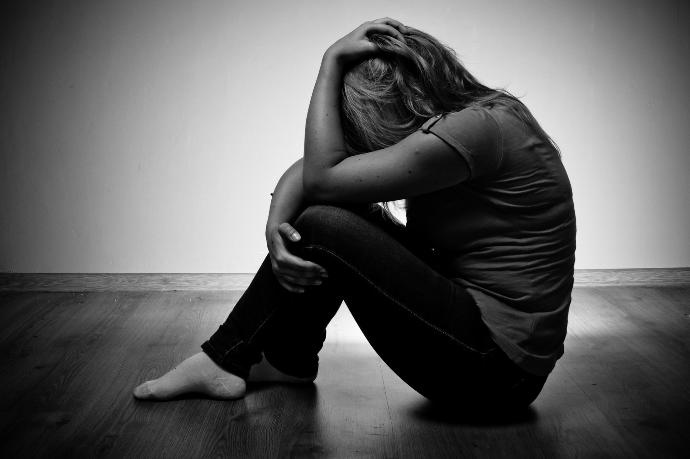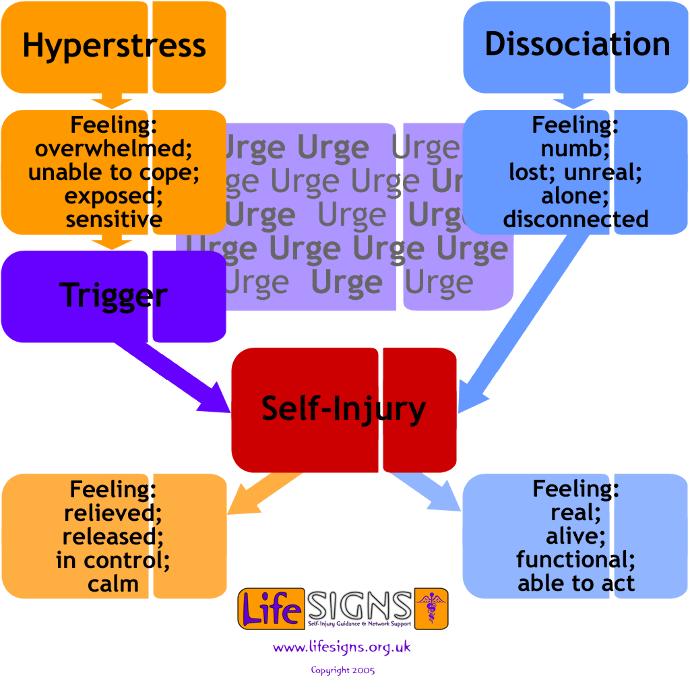Self-Injury; Self-Harm; Self-Mutilation
Warning: potential trigger warning to those who self-injure.

Why people do it is very complex... but will be explained.
First let's go over the importance of this information:
1. You probably know someone who self-injures. (Perhaps yourself).
2. The knowledge can help you deal with and understand a person who does it.
3. It will answer the question that most people want to know and separate fact from fiction.
4. You may find it interesting.
Next, what IS self-injury? What does it include? (Some may surprise you).
1. Cutting with knives, pieces of glass, box-cutters, razors, finger-nails or other sharp instruments.
2. Burning with lighters, stoves, boiling water, hair-straighteners, and other hot objects OR erasers, sandpaper, and other rough objects (which may be used to cause friction burns):
3. Freezing with ice or other cold objects
3. Blunt force with hammers, walls, or other hard, blunt objects
4. Puncturing with needles, nails, safety-pins, pushpins, or other long pointed objects.
5. Starving which is not like anorexia where you consider it beautiful, but in which the person starves themselves because they want to punish or harm their body.
6. Neglect by putting themselves in harms way (getting sick, doing drugs, seeking out abusive relationships, starting fights, etc.)
MYTHS About Self-Injury
1. It is attention-seeking behavior.
This is often believed because you see someone showing off little tiny scratches and seeking attention. It is easy to understand considering that's all you ever see, but this is FAR from reality. You would be quite surprised with how many people you know have scars.
Most (meaning ~99%) are hiding it so well you aren't even aware they are doing it. This pairs along well with the next myth:
2. It is uncommon.
Because the majority of people are hiding their injuries, you probably aren't aware of how many people are doing it but it is very common. About 10% of people will self-injure at some point in their lives. So 1 out of every 10 people you know has self-injured.
3. It is suicidal behavior.
Most people who self-injure are NOT suicidal. Self-injury may be the only thing that keeps them from killing themselves (as strange as that sounds).
4. It is only young girls who self-injure.
While I placed this under "girl's behavior", boys do it too!
About 1 in 5 girls and 1 in 7 boys engage in self-injury. In fact, for children under the age of 10, boys are more likely to self-injure than girls.
In addition, it can happen at any age in life, although it is most common in young people and the elderly.
5. It is the result of mental illness.
While those with disorders such as depression and bipolar are at an increased risk, they are not the only people who self-injure. The elderly, kids who are bullied, victims of abuse, as well as ANYONE could engage in self-injury. Just because they don't have a mental illness or have experienced some traumatic event does NOT mean they couldn't self-injure. NOR does it mean that they are attention-seeking OR that they don't have a reason to do it. As will be explained later, self-injury is just a coping mechanism and can affect anyone.

So why do people self-injure? How could they possibly enjoy it? What could they possibly get from it?
When the average person thinks about self-injury, they are confused. It's hard to grasp how anyone could be doing that and find it enjoyable. Doesn't it hurt? The issue is complex but I will do my best to explain it.
The most simple and general analysis is: It is a coping mechanism.

There are actually multiple reasons and any number of any combination could be why a particular person engages in it.
1. It releases ENDORPHINS.
This chemical makes a person feel really good and provides instant relief when they feel bad or stressed.
This is also the source of pleasure from a "runner's high", riding a roller-coaster, watching a sports game, etc. It is ADDICTIVE.
This means that self-injury is addictive and is the reason it's very hard to quit. It provides instant relief and feels great! Why would that person want to try another coping mechanism when they already have one that makes them feel great and provides instant relief? This will be explained later.
They may also have a high pain tolerance and feel little or no pain at all when they do it (which can happen even when the wounds are very deep), and may be attained after several years of self-injuring. So they only really feel pleasure from doing it.
2. The pain can distract the person from emotional pain.
Sometimes when you get a very painful physical injury, it helps to pinch yourself elsewhere. This can distract you and make the other injury hurt less.
The same is true for emotional pain.
3. They are bleeding themselves.
When the blood flows it can provide relief, as if all the pain and stress were flowing out with the blood.
4. They are punishing themselves.
If they are angry/upset or hate themselves, they may feel they deserve to feel pain and suffer. It is their way of getting back at or punishing themselves.
5. They are numb and just need to feel something.
Pretty self-explanatory.
If you see cuts or scars on a person's arms:
If you see signs indicating a person may engage in self-injury.
REGARDLESS of whether you KNOW them OR NOT...
DO NOT bring it up immediately, shame them, yell at them, or make a scene. The cuts could be years old and you may be upsetting them for no reason.
DO NOT accuse them of anything (especially being attention-seeking)
DO NOT stare.
DO NOT demand they show you their arms.
DO NOT grab their arms and/or attempt to view the injuries up closer.
DO NOT force them to talk about it EVER.
DO NOT cry and tell them how much you love them (it will NOT help the situation and could worsen it so hold it together).
DO NOT tell them all the complications of self-injury. They are aware of the scars and other issues they may deal with, you don't need to remind them.
DO NOT demand they do anything or demand promises that they won't do it again.
DO NOT threaten them (they will just find new creative ways of hiding it)
DO NOT tell parents, friends, OR ANYONE else about it. (It will NOT help the situation and could worsen it!).

Okay... So what should I do?
Friends and family are frequently left in a bad place when they find out someone they care about is self-injuring. There are MANY things they can do wrong, and only a few they can do right. But you should follow these guidelines in helping you to confront and help this person without making things worse.
Bringing it up:
DO wait a few days before bringing it up. It's very hard to see something like that and not bring it up immediately but it is pertinent that you wait.
DO plan a quiet day away in private to talk to them about it (NO PUBLIC PLACES) such as your house to watch movies, play games or hangout.
DO spend an hour or so with them and talk to them about OTHER things BEFORE you bring it up.
WORD YOUR SENTENCES VERY CAREFULLY.
Here is a list of examples of appropriate ways you can bring it up:
1. "You know I care a lot about you right? I saw some marks on your ___ (eg. arm) the other day and I just wanted to let you know that I'm always here for you and I'm always here if you need to talk."
2. "I want to talk to you about something important. I saw some marks on your ___ the other day and I see that you are hurting. I want to let you know that I will do anything in my power to help you feel better. I love you and care about you!"
3. "If you don't want to talk about it, I understand. But I saw some marks on your arms the other day and I just wanted to let you know I'm always here for you. You can call me anytime you want."
NEVER TELL THEM "I UNDERSTAND" unless you currently self-injure or used to self-injure moderately or severely. Self-injuring a few times minorly in the past is not grounds for saying you understand unless they only have small cuts themselves.
If you used to self-injure and it was moderate to severe, it is a great idea to bring it up now. It will let them know you understand and make them feel more comfortable with talking to you about it.
I am not saying that your prior self-injury, if minor and singular, was invalid or doesn't count, but bringing it up will not necessarily help the situation. The person you're talking to will only feel they relate to someone who has self-injured as badly or worse as them. If they have deep scars that hit muscle and you show them a tiny scratch and say you understand, you might only distance yourself from them.
If they do not want to talk about it then, DO NOT force them. The best thing you can do is just let them know that you care about them, you are always there for them, and will do anything you can to make them feel better. Don't make any demands, avoid crying (unless they begin to first).
Give them the BIGGEST bear-hug you could ever give and tell them you love them.

If you are a parent, hide all sharp objects around the house that you are aware of, BUT DON'T FORCE yourself into their room or sneak into their room and steal them. If you do, you could push them to use different and perhaps more dangerous tools. If they want to self-injure, they will find a way.
If they tell you they want help, you can offer to take all their sharp items they injure themselves with. They may just hand them to you without being asked.
Give them support and love. That is the BEST THING you can do for them!
If you self-injure, please feel free to message me :) I'm available for support and I can offer a variety of advice that helped me <3 I haven't self-injured in over 6 years. While I must live with the scars it has taught me a lot and I'm always ready to share my experience and give help wherever I can!
If you have any questions or comments about your own experiences please feel free to ask in the comments section and I will do my best to respond! :)
Now that you have read all of this, here is a very relevant song by Between the Trees.
 Holidays
Holidays  Girl's Behavior
Girl's Behavior  Guy's Behavior
Guy's Behavior  Flirting
Flirting  Dating
Dating  Relationships
Relationships  Fashion & Beauty
Fashion & Beauty  Health & Fitness
Health & Fitness  Marriage & Weddings
Marriage & Weddings  Shopping & Gifts
Shopping & Gifts  Technology & Internet
Technology & Internet  Break Up & Divorce
Break Up & Divorce  Education & Career
Education & Career  Entertainment & Arts
Entertainment & Arts  Family & Friends
Family & Friends  Food & Beverage
Food & Beverage  Hobbies & Leisure
Hobbies & Leisure  Other
Other  Religion & Spirituality
Religion & Spirituality  Society & Politics
Society & Politics  Sports
Sports  Travel
Travel  Trending & News
Trending & News
Most Helpful Opinions